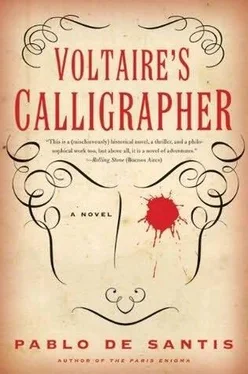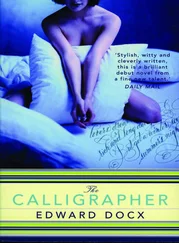No one stopped me at the iron gate or among the columns. I walked down a corridor that began in half-light and ended in absolute darkness. Kolm was waiting for me, partway down, at the bottom of some stairs. All around him were large portraits of famous doctors; despite the stains on his overcoat, it was as if posterity had rubbed off on Kolm as well.
He gestured for me to be quiet, and I followed him, up stairs and down halls, to a room with piles of murky jars, wax sculptures of sections of the brain, and skeletons enveloped in cobwebs.
Kolm sat down at a long table, covered in dozens of yellowing sheets containing the type of meticulous drawings we had become used to in the Encyclopédie . But these were old, the edges and folds ravaged by time. They were highly detailed designs for machines whose purpose became clear only after careful examination.
Leaning over, studying the diagrams intently, Kolm was so different he seemed like an impostor.
“Why are we meeting here and not in the square? What are you doing at the school of medicine, with these old illustrations?”
“We’re in danger apart, but together we’re dead. Here, in this room, we can talk without fear, without anyone seeing us, away from the machinations of Abbot Mazy. Look at everything around us: old, forgotten things. If a person hides among them, he’ll be forgotten, too.”
“I’m surprised they let you be here. You’re not a doctor or a student.”
“One of the professors has a job only I can do. He wants to put an end to executions that become torture because of incompetent executioners. He’s searching for a machine as perfect as the best executioner, who takes life without evoking tears or screams.”
I looked at the plans more closely and began to understand. A sword, made heavier by an oversized hilt, slid down two vertical rails…
“… until it severs the medulla,” Kolm explained in a pedantic tone I’d never heard him use. “It was invented by a Hungarian engineer, who tried it on his wife. He said it was an accident, but no one believed him, and they executed him with it. It was never used again.”
Kolm rummaged for a sheet that was underneath the others.
“Look at this one. The offender is dressed in metal armor. He looks like a warrior ready for combat-only his enemy is the sky: an electric current travels down from a kite flown through a lightning storm. Death is certain and quick, but the weather isn’t.”
In another illustration was a huge ax that hung like a pendulum over the victim, in this case a woman whose black hair seemed to have a life of its own. A second drawing showed her headless.
“A Spanish invention used by the Inquisition in the sixteenth century. No matter how heavy the ax is, because it cuts on a diagonal, it rarely detaches the head completely. Now I’ll show you my favorite.”
This wasn’t a plan but an old engraving; it showed a simple structure, just two rails that a blade traveled down.
“The Halifax gibbet, used in England in the sixteenth century, apparently with excellent results. I’ve almost decided on this model. It won’t be hard to build: all you need is wood and a blade, and enough lead to make sure it drops fast and hard. If it works, there’ll be no need for executioners; anyone will be able to kill. It’s a shame: us old executioners, with our knowledge and our customs, will disappear forever, replaced by clerks who simply have to pull a rope. We’ll be forgotten, like calligraphers.”
Kolm was already reaching for more diagrams to show me; I had to interrupt his explanations.
“I didn’t come looking for deadly inventions but, rather, advice. Clarissa Von Knepper has disappeared. I told her father I’d find her.”
“And why did you promise him that?”
“There’s something I have to do, and he’s the only one who can help me.”
“Not the bishop again? I hope you don’t find her then.”
Kolm looked behind a statue of Hippocrates, in among anatomical specimens, for a bottle of liquor that he set down in front of me. It was sweet but strong.
“Drink and forget. The work you do is unsavory, and I need an assistant. I promised the doctor he’d have his machine in a few days.”
“How will you test it?”
“There’s never any shortage of volunteers here.”
“I can’t help you, Kolm. I’ve come a long way to finish a job.”
“A job that will finish you. Well, if that’s what you want… But bear in mind, this doctor pays well, and he doesn’t have any significant enemies, yet. Your employer, this Voltaire, on the other hand…”
With a look of disappointment, Kolm turned back to his plans and pulled out a map.
“That’s not a machine; it’s Paris,” I said.
The city was so vast, so full of streets and names, it seemed I’d never find something as small as a woman in it.
“A brotherhood of heretics with ties to smuggling-they called themselves the Syracusans-would use the city in their executions. Whenever they suspected a brother was going to leave the sect, he was sentenced to death, but they believed the city always had the last word. One of them would take the role of executioner and wait in a room until midnight. The offender, who didn’t know his fate, was told to cross the city and get to the appointed room. If there were no problems along the way, he’d arrive thinking he’d completed his task and would be pardoned, when, in fact, the moment he opened the door he’d be executed with a Norman sword. However, if traffic or other obstacles stopped the offender, forcing him to detour and delaying him, he’d be saved.”
Palaces, bridges, churches, cemeteries. It took my finger just as long to trace a quiet street as another where I’d have been killed for merely setting foot.
“Where in this city could a young woman hide?”
“So you’re really going to look for her? You’ve already had to escape once. Maybe, like the Syracusans’ victims, an executioner is waiting for you in a darkened room.”
The liquor seemed to boost my spirits after a while. It simplified the city map, erasing entire streets and neighborhoods. All I had to do was turn a corner to find Clarissa, to save her and myself.
“Check the convents,” Kolm suggested.
“I know she wouldn’t go there. She’s had enough of being cloistered.”
“What does Von Knepper’s daughter know how to do?”
“Nothing. Absolutely nothing.” I thought for a moment and corrected myself. “She knows how to do one thing: stay still.”
With the nearly empty bottle in his hand, Kolm pointed to Hippocrates:
“Then ask the statues. They know the secret.”
Every Tuesday morning models would gather in the basement of the Académie des Beaux-Arts in search of work. Three big iron stoves tried in vain to heat the room, where the cold seemed to come not from outside but from the statues forgotten in the dark. Those sculptures, once proud exhibits and then inconvenient obstacles, were pushed by the whims of art down into the underground world. Every now and then an expedition would arrive: critics or sculptors would decide to bring back a former style or a forgotten artist, and archangels, Madonnas, or Greek gods would rise up to the surface again.
The youngest women came from the countryside or abroad; rather than showing any conviction in their new line of work, they seemed to curl their bodies into question marks as they undressed near the glow of the great stoves. There was a Chinese folding screen, red lacquer with silk panels, but no one bothered to use it; the drawings made it seem much more indecent than nudity itself.
I had managed to blend in with those who came to the basement in search of models. The young women displayed their figures, some opulent and others angular, while the artists would judge and perhaps propose a deal. If the day’s wages were acceptable, the girls would leave with the painters.
Читать дальше
Конец ознакомительного отрывка
Купить книгу












